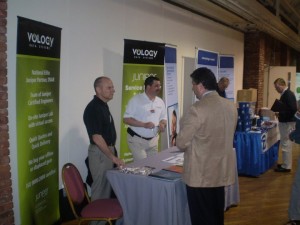Posts Tagged ‘Scott Valcourt’
Friday, May 13th, 2011
This post was provided by State Broadband Director Carol Miller who was one of the driving forces behind the Telecom Summit – great job by all associated with this event!
The 2011 NH Telecommunication Summit on May 11 at the Radisson in Manchester NH was an exciting gathering of service providers, technology companies, state agencies, regional planning commissions, municipalities and business. Sponsored by NH Business Review, the NH Division of Economic Development, the New Hampshire Telecommunications Association, Head Networks and G4 Communications.
 Roy Duddy, Interim Director, Division of Economic Development welcomed a crowd of close to 150 participants. He thanked everyone for their support and interest in the discussion surrounding expansion of broadband to unserved and underserved communities in the State of NH. Roy Duddy, Interim Director, Division of Economic Development welcomed a crowd of close to 150 participants. He thanked everyone for their support and interest in the discussion surrounding expansion of broadband to unserved and underserved communities in the State of NH.
Carol Miller, Director of Broadband Technologies at the Division assumed the role of master of ceremonies keeping attendees on track for the keynote, breakout sessions, and a service provider panel as Industry Leaders share their insight.
“This represents the first time in several years that providers, municipalities, and businesses have gathered to share information and resources about telecommunications,” she said.
The keynote was delivered by Scott Valcourt, UNH on the Network NH Now, and other initiatives that build upon the federally funded assets in construction that will build middle mile fiber to all 10 counties of NH. The Public Safety Microwave Project encompasses a planned upgrade of state agency facilities to a multi-user platform to free up space on state owned mountain tops for wireless broadband providers. The New Hampshire Fastroads LLC will bring that fiber to the customer premise in two last mile projects in Rindge and Enfield. In addition, Valcourt talked about the impact to economic development and the way it will change and enhance telemedicine, education, and job growth opportunities for the people of NH.
Breakout sessions included “Wireless/Cellular Technology Today” by AT&T’s Brian Krause, “Where’s My Broadband?” by Michael Blair of the NH Mapping and Planning Program at UNH, “Telecom 101 for Businesses and Municipalities” by Cisco’s Paul Gasparro and “Who Needs Broadband?” hosted by Carol Miller, Director of Broadband Technologies for the State of NH.
The Service Provider Panel was moderated by Matt Cookson, Executive Director of NH High Tech Council. The Panelists were Brad Scofield, Regional Director of Product Management for Comcast, Jeremy Katz, CEO of segTEL, Gunnar Berg, CEO of Cyperpine Wireless and Bill Meehan Director of Segment Marketing of FairPoint Communications.
Each panelist described their company products and footprint. They answered questions about expansion to rural areas, and business incentives to enhance investments in infrastructure.
Allen Voivod of Epiphanies Inc., provided the social media blitz for the Summit thanks to the generous sponsorship of G4 Communications. Video from the event can be seen online at the following location: http://www.youtube.com/NHEconomy, and photos can be seen at http://on.fb.me/2011TelecomSummit. Read the event’s comments on Twitter by following the hashtag #NHTelecom.
Tags: Allen Voivod, AT&T, Bill Meehan, Brad Scofield, Brian Krause, Carol Miller, Cisco, Comcast, Cyperpine Wireless, Epiphanies Inc., FairPoint Communications, G4 Communications, Gunnar Berg, Head Networks, Jeremy Katz, Matt Cookson, Michael Blair, Network NH Now, New Hampshire Fast Roads LLC, NH Business Review, NH Division of Economic Development, NH High Technology Council, NH Mapping and Planning Program, NH Telecommunications Association, Radisson, Roy Duddy, Scott Valcourt, segTEL, UNH
Posted in NH Business Matters | Comments Off on #NHTelecom Summit a Great Success
Tuesday, April 19th, 2011
Network New Hampshire Now (NNHN) has begun the first phase in bringing affordable broadband access to the state’s under-served citizens, schools and businesses by awarding a NH-based company a contract to construct a middle-mile fiber-optic network.
 Nashua-based New Hampshire Optical Systems (NHOS) will soon begin construction of a 500+ mile high-speed network stretching from the seacoast to the southwest region, up to the northwest, the North Country, and through the lakes region. The $34 million project, one of the largest fiber networks in the country, is expected to bring many new construction and technology jobs to the state. When complete, the middle mile network aims to improve economic development in NH communities with little to no access to affordable broadband today. Nashua-based New Hampshire Optical Systems (NHOS) will soon begin construction of a 500+ mile high-speed network stretching from the seacoast to the southwest region, up to the northwest, the North Country, and through the lakes region. The $34 million project, one of the largest fiber networks in the country, is expected to bring many new construction and technology jobs to the state. When complete, the middle mile network aims to improve economic development in NH communities with little to no access to affordable broadband today.
The middle mile network is the first and largest part of a three-phase initiative resulting from New Hampshire’s Broadband Technology Opportunities Program (BTOP) federal grant from the National Telecommunications and Information Administration (NTIA), which NNHN spearheaded. NNHN is a collaboration of NH-based public and private partners focused on building and interconnecting high-speed broadband networks in all 10 state counties. Additional projects include an enhanced wireless public safety network and public television network, connectivity for an intelligent transportation system, and last mile “fiber to the home” in two pilot communities. As the core component supporting many of these projects, the middle mile network is the recipient of the largest portion of the BTOP grant.
New Hampshire Optical Systems was chosen from among five finalists following an intensive, five-month open bid and evaluation process.
“It was a highly competitive process with tough federal grant requirements. NHOS met or exceeded all of the NTIA requirements soundly, while also submitting the lowest cost bid,” said Scott Valcourt, who leads New Hampshire’s BTOP grant for NNHN. “We believe NHOS will be a strong partner who will complete the project on time and on budget.”
NHOS is a for-profit fiber communications firm who is teaming with Waveguide, a Chelmsford, MA company with expertise in engineering, management, construction and maintenance of fiber optic networks. The companies’ executive teams have a strong track record of assembling fiber networks across N.H. and the northeastern U.S., including many of the Fortune 500 network providers, wireless carriers, and municipalities. NHOS is investing $10 million of its own capital into the project, bringing the total investment in the middle mile initiative to $34 million. Along with this financial investment, the company plans to invest in NH workforce development with the establishment of an apprenticeship program in support of the project to help students in the state gain career training, experience, and jobs in advanced networking technologies.
“We are proud to be part of the effort to expand broadband throughout the state and the country,” said Dave Reusch, general manager of New Hampshire Optical Systems. “We believe our team is uniquely qualified to develop and manage the middle mile network.”
The “middle mile” forms the communications backbone linking a network operator’s core network to local systems and their user base – the same way Interstate 93 provides the corridor for traffic to and from other roads and their surrounding communities. The network will be open to any organization wanting to provide Internet services to end-users, including homes, schools, healthcare facilities, businesses and other enterprises. NHOS will build, own, and manage the middle mile fiber network, and will sell wholesale fiber connectivity along the route, as mandated by the BTOP grant requirements.
The NNHN project aims to dramatically increase broadband access throughout the state by creating an open access network, which will increase choice and competition among network providers, making it economically feasible for them deliver service to end-user communities across the state. It will also try to capitalize on as much existing, available fiber network assets in the state as possible.
NNHN has received $44.5 million in economic stimulus money from the NTIA to fund critically needed broadband expansion across the state. Led by the University of New Hampshire, Network New Hampshire Now was brought together by the NH Division of Economic Development. It was guided by the Governor’s Telecommunications Advisory Board (TAB), and the 2008 New Hampshire Broadband Action Plan. The grant will be matched with nearly $22 million in private cash and in-kind funding.
Tags: Dave Reusch, National Telecommunications and Information Administration, Network New Hampshire Now, New Hampshire Optical Systems, Scott Valcourt, University of New Hampshire, Waveguide
Posted in NH Business Matters | Comments Off on Network New Hampshire Now to Break Ground on Statewide High-Speed Broadband Network
Monday, April 18th, 2011
Imagine a day without email, teleconferencing, online videos, Google or cell phone access. In today’s world, broadband access is critical—especially to business growth, economic development, education and telemedicine—as we become more reliant on digital communication, from email to teleconferencing and social media.
 How State government, municipalities, businesses and providers can work together to expand and improve broadband access throughout New Hampshire will be the focus of the 2011 New Hampshire Telecommunication Summit, which will be held on Wednesday, May 11 at the Radisson Hotel Manchester Downtown. Sponsored by the NH Division of Economic Development, the NH Telecommunication Association (NHTA), HEADNetworks and NH Business Review, the summit will provide attendees with the opportunity to learn from leaders in the industry and see the latest in voice and data technology. How State government, municipalities, businesses and providers can work together to expand and improve broadband access throughout New Hampshire will be the focus of the 2011 New Hampshire Telecommunication Summit, which will be held on Wednesday, May 11 at the Radisson Hotel Manchester Downtown. Sponsored by the NH Division of Economic Development, the NH Telecommunication Association (NHTA), HEADNetworks and NH Business Review, the summit will provide attendees with the opportunity to learn from leaders in the industry and see the latest in voice and data technology.
According to Carol Miller, Director of Broadband Technology for the State of New Hampshire, “This represents the first time in several years that providers, municipalities and businesses will gather to share information and resources about telecommunications. While we’re justifiably proud that New Hampshire ranks second in the nation for households with broadband access, we still have a lot of work to do to expand broadband to rural areas. Businesses tend to locate where broadband is, so making broadband, including wireless, available in rural areas is important to our economy.”
On the agenda will be an address by Scott Valcourt, UNH Adjunct Faculty Member in
Science & Technology Division, Computer Information Systems Program, who will speak on “New Hampshire’s Newest Broadband Initiative.” A panel discussion by New Hampshire service providers on “Statewide Broadband and Business Expansion Incentives” will be moderated by Matt Cookson, executive director of the New Hampshire High Technology Council.
Three breakout sessions—“Wireless/Cellular Technology Today,” “Where’s My Broadband?” and “Telecom 101 for Businesses and Municipalities”— will be offered, as well as lunch and ample time to meet with exhibitors.
Cost to attend the summit is $75 per person, which includes lunch. Registration begins at 7:45 a.m., with the program running from 8:45 a.m. to approximately 2pm. Register online at www.nhtelecom.org/Summit2011. For more information, call NHTA at 1-800-400-NHTA (6482) or email Summit@nhtelecom.org. Sponsorship opportunities are still available.
Lodging is available at the Radisson, which is located at 700 Elm Street in Manchester. Call (603) 625-1000 and use “NHTA” to receive the attendee discount.
Tags: Carol Miller, HEADNetworks, Matt Cookson, New Hampshire High Technology Council, New Hampshire Telecommunications Summit, NH Business Review, NH Division of Economic Development, NH Telecommunication Association, Radisson Hotel Manchester Downtown, Scott Valcourt
Posted in NH Business Matters | Comments Off on Businesses, Government and Providers to Gather at Telecommunications Summit
Thursday, April 1st, 2010
Network New Hampshire Now (NNHN), a collaboration of public and private partners from across the state, submitted a $66 million proposal to the National Telecommunications & Information Administration’s Broadband Technology Opportunities Program (NTIA BTOP) to fund critically needed broadband expansion in New Hampshire. The proposal, submitted on behalf of NNHN by the University of New Hampshire March 26, calls for building a middle-mile fiber optic network that will connect homes, businesses and community organizations to help advance economic development, education, health care and public safety across the state. NTIA will decide by late summer whether to accept the proposal.
 “The middle-mile fiber network is seen as a major opportunity for economic development. In particular, the network designed for New Hampshire has openness as its core purpose – it will enable affordable choices for all providers to reach areas of the state that have been difficult to service,” said George Bald, commissioner of the state Department of Resources & Economic Development (DRED), one of the collaborating partners involved in the grant application. “The Network New Hampshire Now proposal puts the state on par with international fiber optic broadband capacity and capability.” “The middle-mile fiber network is seen as a major opportunity for economic development. In particular, the network designed for New Hampshire has openness as its core purpose – it will enable affordable choices for all providers to reach areas of the state that have been difficult to service,” said George Bald, commissioner of the state Department of Resources & Economic Development (DRED), one of the collaborating partners involved in the grant application. “The Network New Hampshire Now proposal puts the state on par with international fiber optic broadband capacity and capability.”
The NNHN project will expand broadband in all 10 counties in New Hampshire in three ways. First, existing middle-mile fiber from the Seacoast, across to the southwest, up to the northwest, on to the North Country, and through the Lakes Region will be expanded and new fiber will be put in place. Second, an innovative model called FastRoads will be implemented to provide fiber optic connectivity in communities, starting with Rindge, in the southwest near the Massachusetts border and Enfield in western New Hampshire. Finally, the project includes the construction of a middle-mile microwave network for public safety, public television and mobile broadband communications on mountaintops across New Hampshire.
In addition to UNH and DRED, NNHN partners include the Community Development Finance Authority, all University System of New Hampshire institutions, the Community College System of New Hampshire, the Keene Municipal Broadband Committee, Southwest Regional Planning Commission, North Country Investment Corporation, town managers in Hanover and Keene, state legislators, and telecommunications vendors.
“UNH is proud to submit this proposal on behalf of the citizens of New Hampshire,” said Joanna Young, chief information officer at UNH. “A key strength of this proposal is the public and private partnership it represents, as well as its scope and reach.”
The NNHN initiative is endorsed and supported by numerous entities that understand its potential to expand broadband in the state and provide high speed access to areas where such access will have an instant impact on economic development efforts. Numerous letters of support have been received from hospitals, libraries, business associations, state legislators, and university presidents.
“The growth engine of education, health services, and economic development requires this technology to help New Hampshire be competitive today and in the future,” said Scott Valcourt, the principal investigator at UNH for the grant proposal. “With NTIA funding, the dream of an open access, high speed broadband network will be realized.”
Tags: Community College System of New Hampshire, Community Development Finance Authority, Joanna Young, Keene Municipal Broadband Committee, National Telecommunications & Information Administration, Network New Hampshire Now, New Hampshire Department of Resources & Economic Development, North Country Investment Corporation, Scott Valcourt, Southwest Regional Planning Commission, University of New Hampshire
Posted in NH Business Matters | Comments Off on Statewide Collaborative Seeks Broadband Expansion
Wednesday, September 16th, 2009
Plans for high speed linkages that connect Northern New Hampshire to Manchester and extend into additional networks in Northern New England received a major boost when the National Science Foundation (NSF) announced a $1.2 million grant to support building this fiber path. The funds will create new linkages among higher education institutions in New Hampshire, including the University of New Hampshire, Plymouth State University and Dartmouth College to help support collaborative research and education initiatives regionally, nationally, and internationally.
 Funds are being awarded through the NSF’s EPSCoR (Experimental Program to Stimulate Competitive Research) Office’s Research Infrastructure Improvement Program Track-2 grant (RII Track-2). The University of New Hampshire, which hosts the New Hampshire EPSCoR Office, is the grant recipient. The University System of New Hampshire operates the current network that serves its four institutions and provides Internet and connectivity services to the Community College System of New Hampshire, and several K-12 schools, libraries, public service centers, and public health and safety organizations across the state. These funds will, in part, help advance larger efforts to develop a regional optical network that will have significantly greater bandwidth speed and help address current and future bandwidth demands. Funds are being awarded through the NSF’s EPSCoR (Experimental Program to Stimulate Competitive Research) Office’s Research Infrastructure Improvement Program Track-2 grant (RII Track-2). The University of New Hampshire, which hosts the New Hampshire EPSCoR Office, is the grant recipient. The University System of New Hampshire operates the current network that serves its four institutions and provides Internet and connectivity services to the Community College System of New Hampshire, and several K-12 schools, libraries, public service centers, and public health and safety organizations across the state. These funds will, in part, help advance larger efforts to develop a regional optical network that will have significantly greater bandwidth speed and help address current and future bandwidth demands.
“This research and corresponding network development will thrust New Hampshire and the northeast region into the international research stage with the ability to collaborate with cyber-enabled tools and resources in ways that have not yet been possible,” said Scott Valcourt, UNH director of project management and consulting services for information technology and the New Hampshire principal investigator. “That research will have other economic development and quality of life benefits for New Hampshire citizens.”
The grant is a result of collaborative work by multiple NSF EPSCoR states that helped form the Northeast Cyberinfrastructure Consortium (NECC) in 2006. Officials in Maine, New Hampshire, Rhode Island, Vermont, and Delaware initiated two related efforts to identify and promote the shared use of research facilities across the region and assess and address cyber-infrastructure needs. The NSF EPSCoR grant, combined with the National Institutes of Health Centers of Biomedical Research Excellence (COBRE) Supplement grant award to Dartmouth in August 2009, adds research infrastructure in a region of the country where the lack of bandwidth presents a significant barrier to tapping regional and national resources. The COBRE Supplement will extend the core research network to include Keene State College.
“Many of our leading academic centers that are constrained by the current fiber capacity will benefit, including the Institute for the Study of Earth, Oceans and Space at UNH, the Northern New England Computing Grid that is led by Dartmouth, and the Plymouth State University Meteorology Program,” said Tom Franke, the USNH chief information officer. “The fiber optic path will also continue to the University of Vermont, creating another significant opportunity for research collaboration.”
The NECC states have created NEBC (North East Bioinformatics Collaborative), a virtual organization that facilitates research projects that require data analysis for large data sets. Pilot projects on issues such as algae blooms are planned and the regional network will enable participating states to collaborate, exchange students, and work together from remote locations by taking advantage of video conferencing and other high speed services not currently available. The majority of the funds will be used for 12 fiber strands from Manchester to Plymouth to Hanover, the electronic equipment to operate the fiber network, and support for student participants in the algae bloom studies taking place in the NECC states.
The NSF established EPSCoR to assist states that traditionally have received lower levels of federal funding. Since New Hampshire became an EPSCoR jurisdiction in 2004, more than $15 million in EPSCoR research grants have been awarded by NSF, NASA, and the departments of energy and defense. NH EPSCoR is administered by the University of New Hampshire with oversight by a 14-member committee composed of representatives from industry, government and academia.
Tags: Community College System of New Hampshire, Dartmouth College, EPSCoR, National Institutes of Health Centers of Biomedical Research Excellence, National Science Foundation, Northeast Cyperinfrastructure Consortium, Plymouth State University, Scott Valcourt, Tom Franke, University of New Hampshire, University of Vermont
Posted in NH Business Matters | Comments Off on NSF $1.2M Grant to Support Hanover-Plymouth-Manchester High Bandwidth Research and Education Network
|
 Roy Duddy, Interim Director, Division of Economic Development welcomed a crowd of close to 150 participants. He thanked everyone for their support and interest in the discussion surrounding expansion of broadband to unserved and underserved communities in the State of NH.
Roy Duddy, Interim Director, Division of Economic Development welcomed a crowd of close to 150 participants. He thanked everyone for their support and interest in the discussion surrounding expansion of broadband to unserved and underserved communities in the State of NH.









 Nashua-based New Hampshire Optical Systems (NHOS) will soon begin construction of a 500+ mile high-speed network stretching from the seacoast to the southwest region, up to the northwest, the North Country, and through the lakes region. The $34 million project, one of the largest fiber networks in the country, is expected to bring many new construction and technology jobs to the state. When complete, the middle mile network aims to improve economic development in NH communities with little to no access to affordable broadband today.
Nashua-based New Hampshire Optical Systems (NHOS) will soon begin construction of a 500+ mile high-speed network stretching from the seacoast to the southwest region, up to the northwest, the North Country, and through the lakes region. The $34 million project, one of the largest fiber networks in the country, is expected to bring many new construction and technology jobs to the state. When complete, the middle mile network aims to improve economic development in NH communities with little to no access to affordable broadband today.  How State government, municipalities, businesses and providers can work together to expand and improve broadband access throughout New Hampshire will be the focus of the 2011 New Hampshire Telecommunication Summit, which will be held on Wednesday, May 11 at the Radisson Hotel Manchester Downtown. Sponsored by the NH Division of Economic Development, the NH Telecommunication Association (NHTA), HEADNetworks and NH Business Review, the summit will provide attendees with the opportunity to learn from leaders in the industry and see the latest in voice and data technology.
How State government, municipalities, businesses and providers can work together to expand and improve broadband access throughout New Hampshire will be the focus of the 2011 New Hampshire Telecommunication Summit, which will be held on Wednesday, May 11 at the Radisson Hotel Manchester Downtown. Sponsored by the NH Division of Economic Development, the NH Telecommunication Association (NHTA), HEADNetworks and NH Business Review, the summit will provide attendees with the opportunity to learn from leaders in the industry and see the latest in voice and data technology. “The middle-mile fiber network is seen as a major opportunity for economic development. In particular, the network designed for New Hampshire has openness as its core purpose – it will enable affordable choices for all providers to reach areas of the state that have been difficult to service,” said George Bald, commissioner of the state Department of Resources & Economic Development (DRED), one of the collaborating partners involved in the grant application. “The Network New Hampshire Now proposal puts the state on par with international fiber optic broadband capacity and capability.”
“The middle-mile fiber network is seen as a major opportunity for economic development. In particular, the network designed for New Hampshire has openness as its core purpose – it will enable affordable choices for all providers to reach areas of the state that have been difficult to service,” said George Bald, commissioner of the state Department of Resources & Economic Development (DRED), one of the collaborating partners involved in the grant application. “The Network New Hampshire Now proposal puts the state on par with international fiber optic broadband capacity and capability.” Funds are being awarded through the NSF’s EPSCoR (Experimental Program to Stimulate Competitive Research) Office’s Research Infrastructure Improvement Program Track-2 grant (RII Track-2). The University of New Hampshire, which hosts the New Hampshire EPSCoR Office, is the grant recipient. The University System of New Hampshire operates the current network that serves its four institutions and provides Internet and connectivity services to the Community College System of New Hampshire, and several K-12 schools, libraries, public service centers, and public health and safety organizations across the state. These funds will, in part, help advance larger efforts to develop a regional optical network that will have significantly greater bandwidth speed and help address current and future bandwidth demands.
Funds are being awarded through the NSF’s EPSCoR (Experimental Program to Stimulate Competitive Research) Office’s Research Infrastructure Improvement Program Track-2 grant (RII Track-2). The University of New Hampshire, which hosts the New Hampshire EPSCoR Office, is the grant recipient. The University System of New Hampshire operates the current network that serves its four institutions and provides Internet and connectivity services to the Community College System of New Hampshire, and several K-12 schools, libraries, public service centers, and public health and safety organizations across the state. These funds will, in part, help advance larger efforts to develop a regional optical network that will have significantly greater bandwidth speed and help address current and future bandwidth demands.